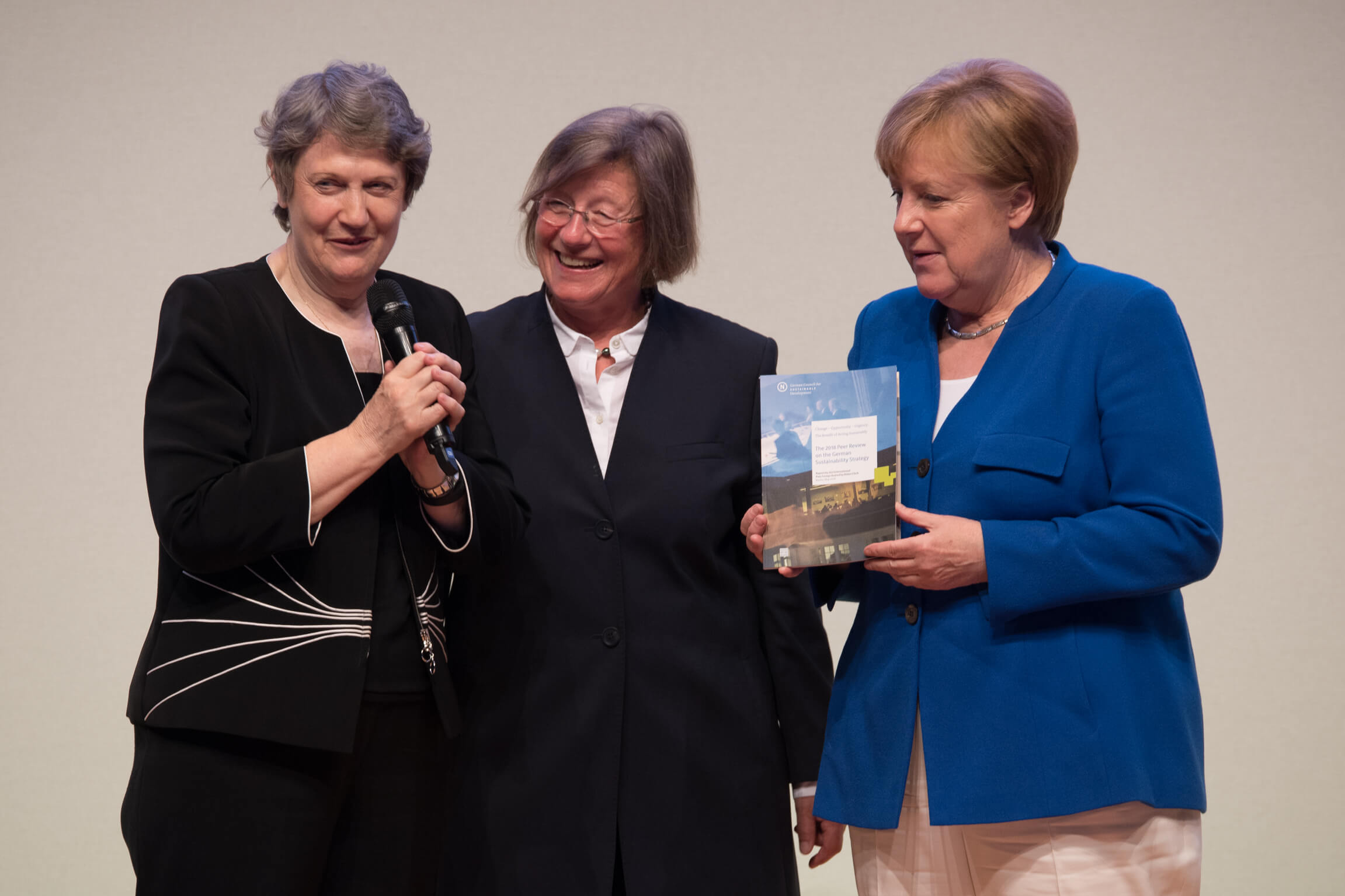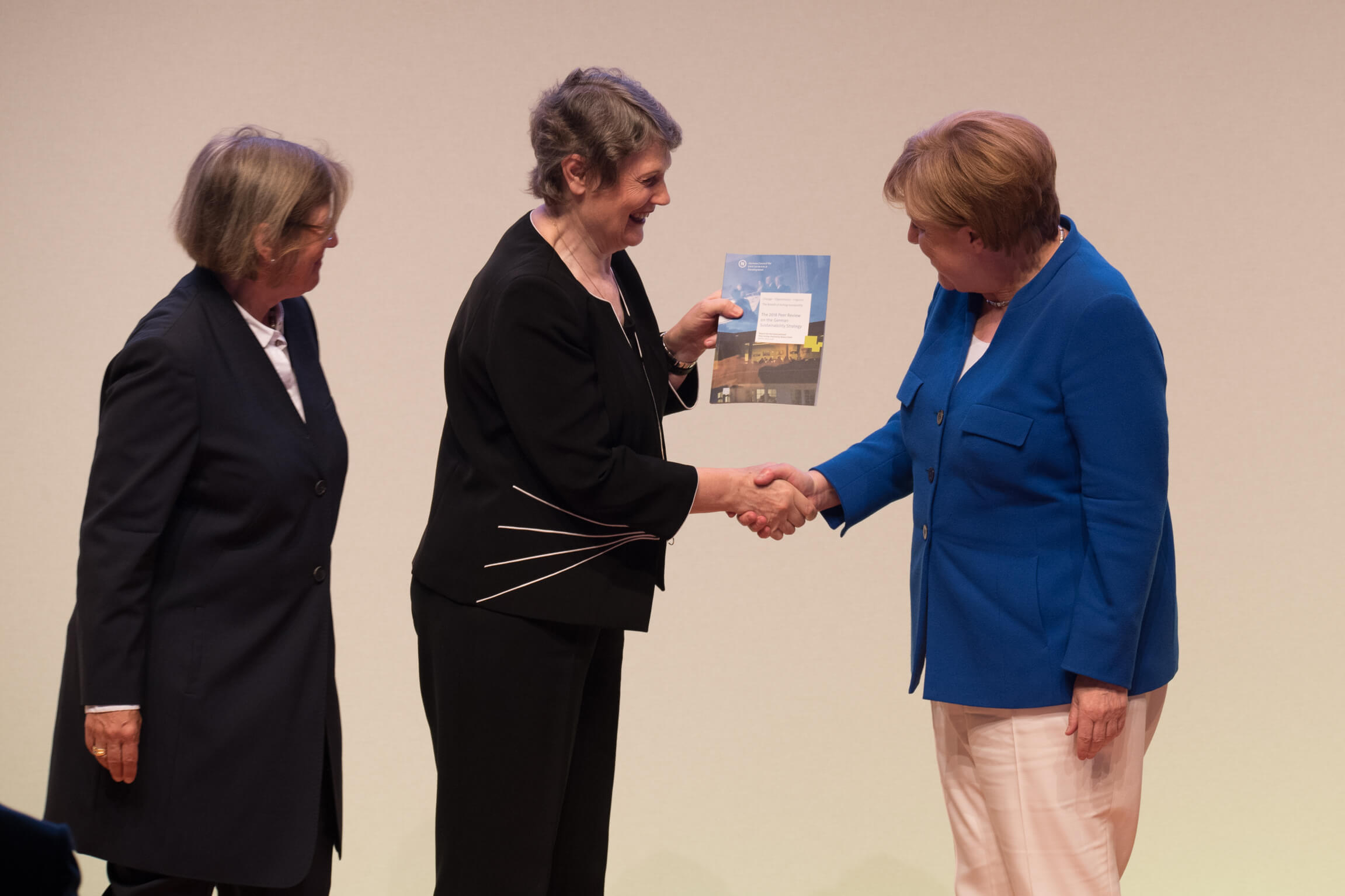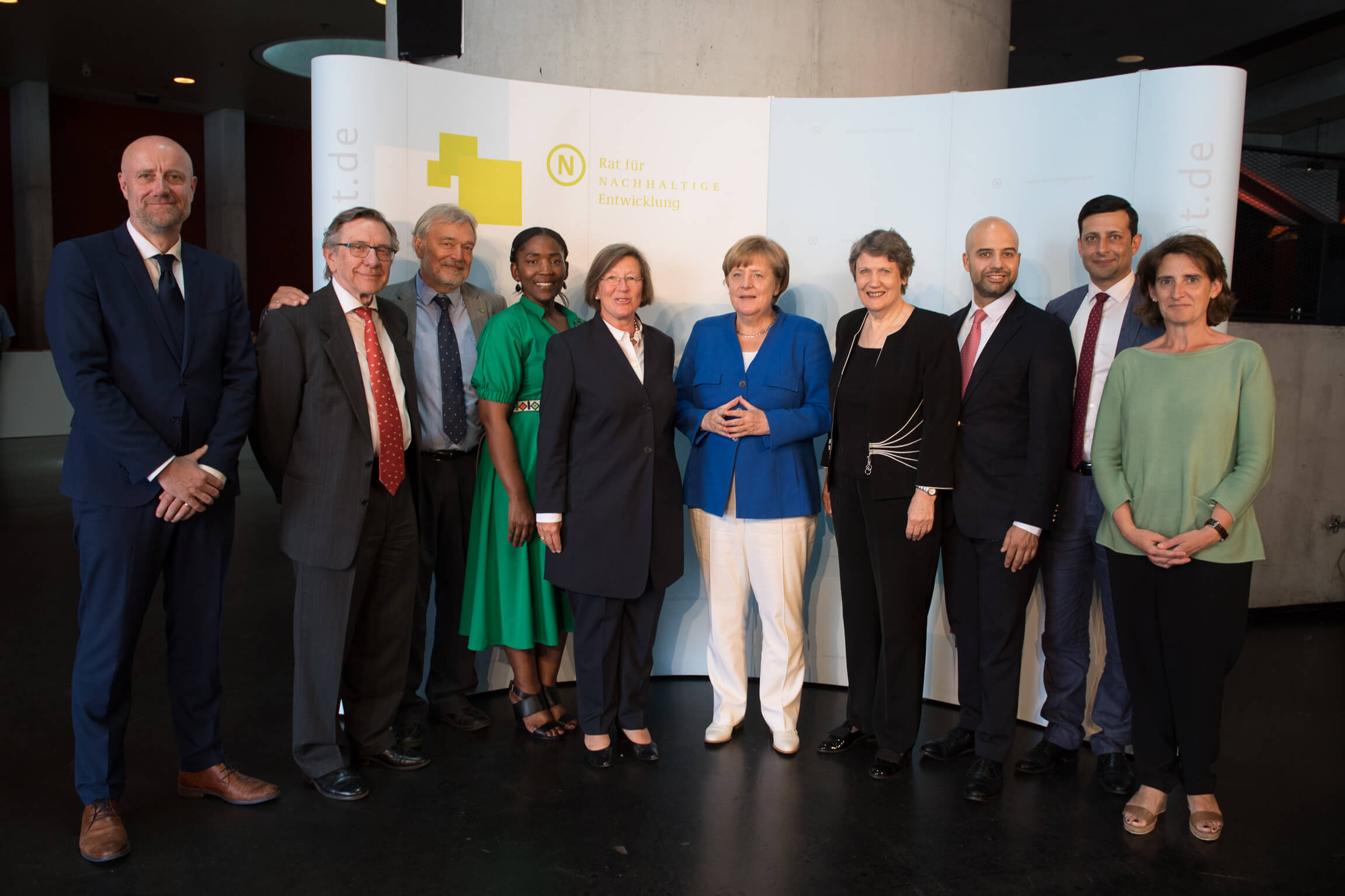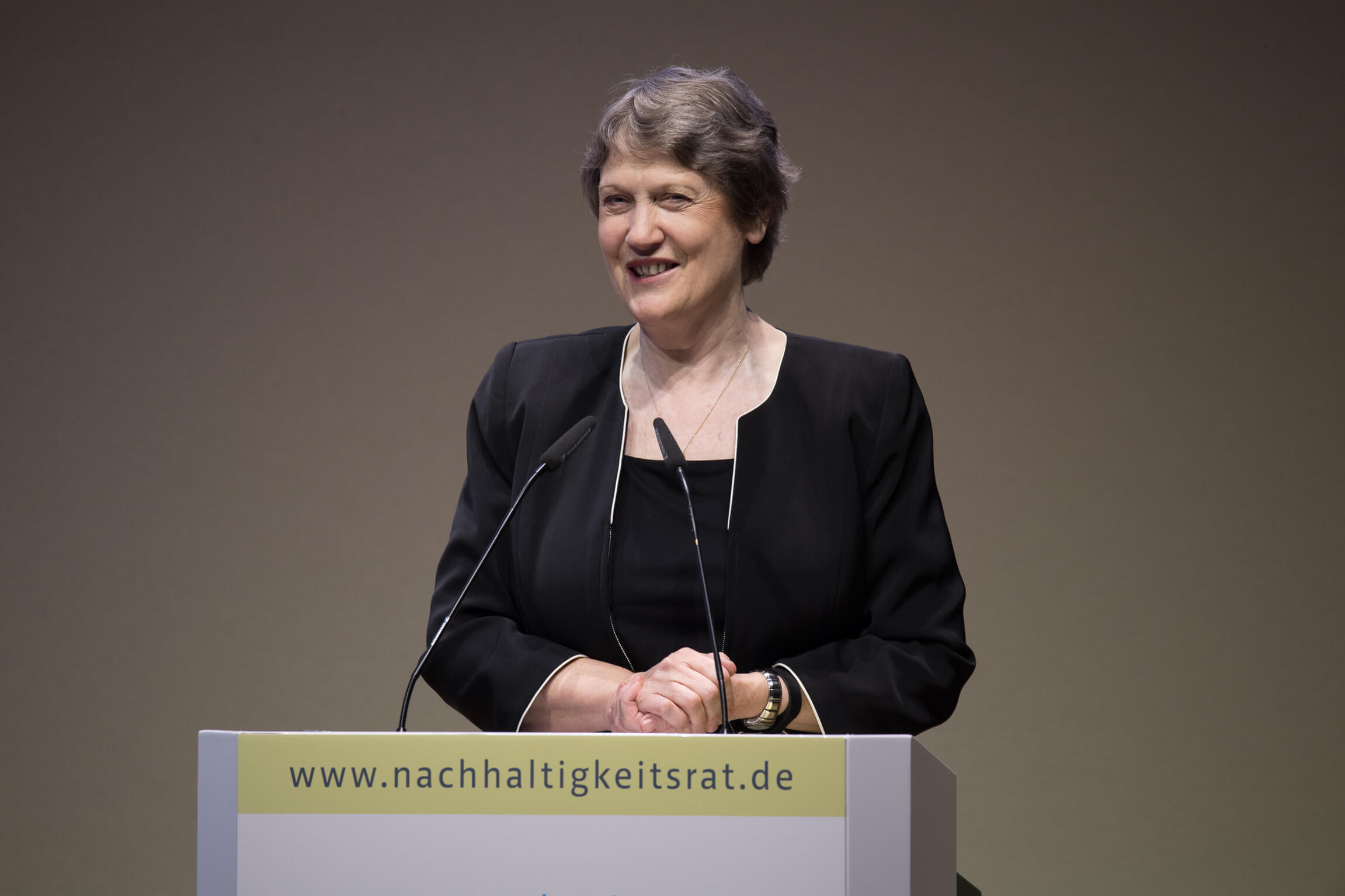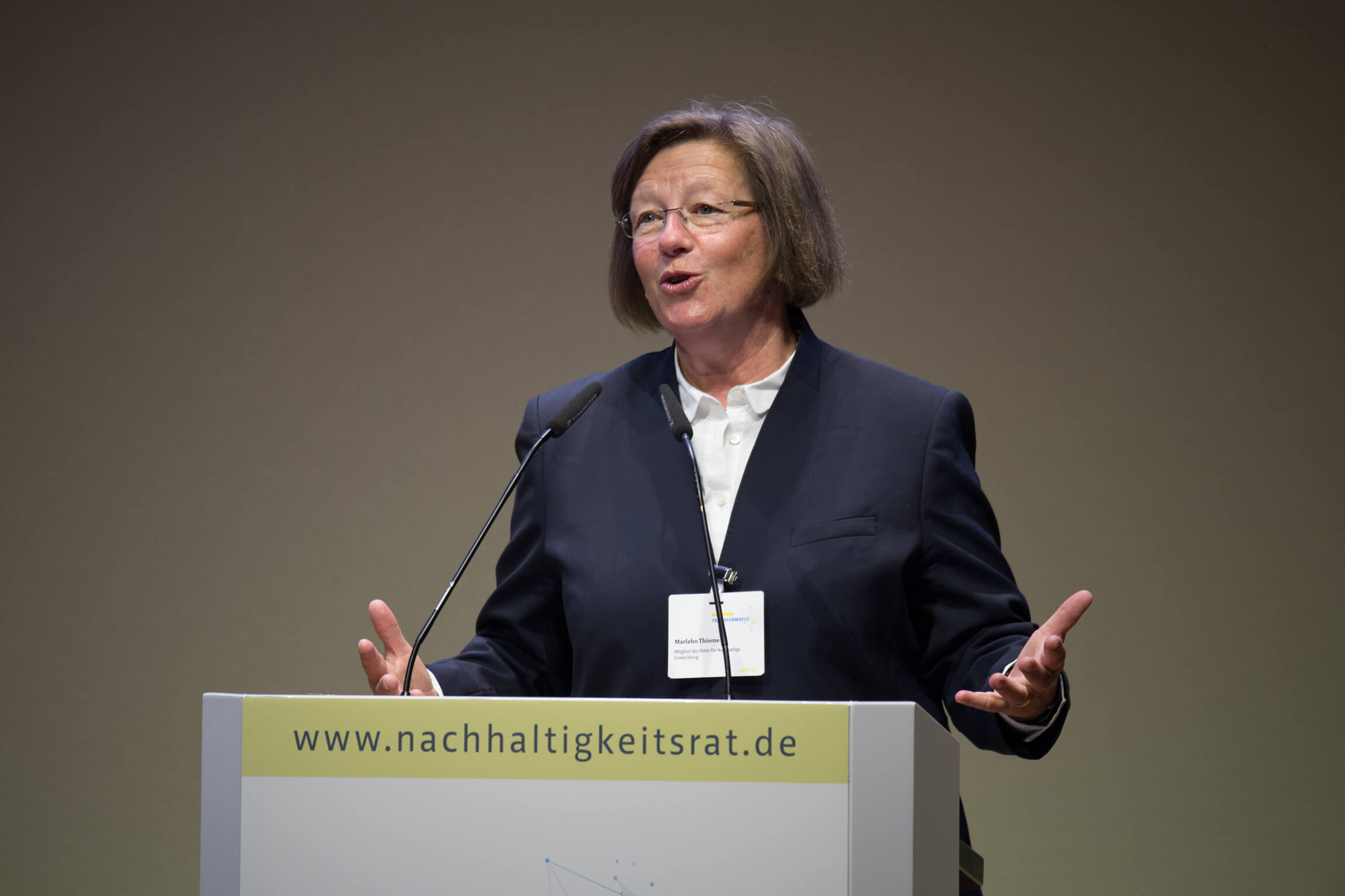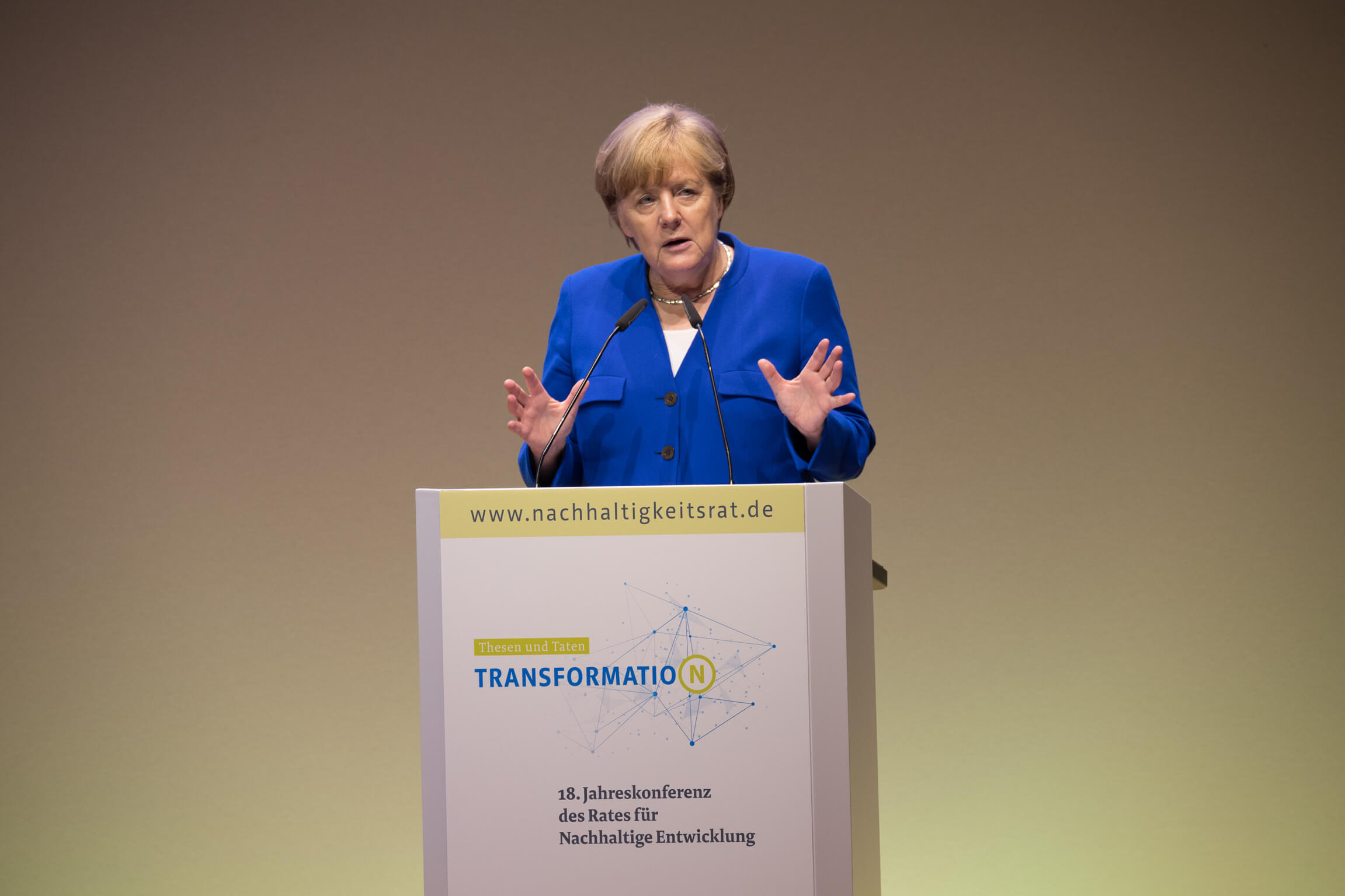An international group of experts presents their assessment of sustainability policy in Germany at the German Council for Sustainable Development’s annual conference – and makes 11 recommendations regarding what needs to change.
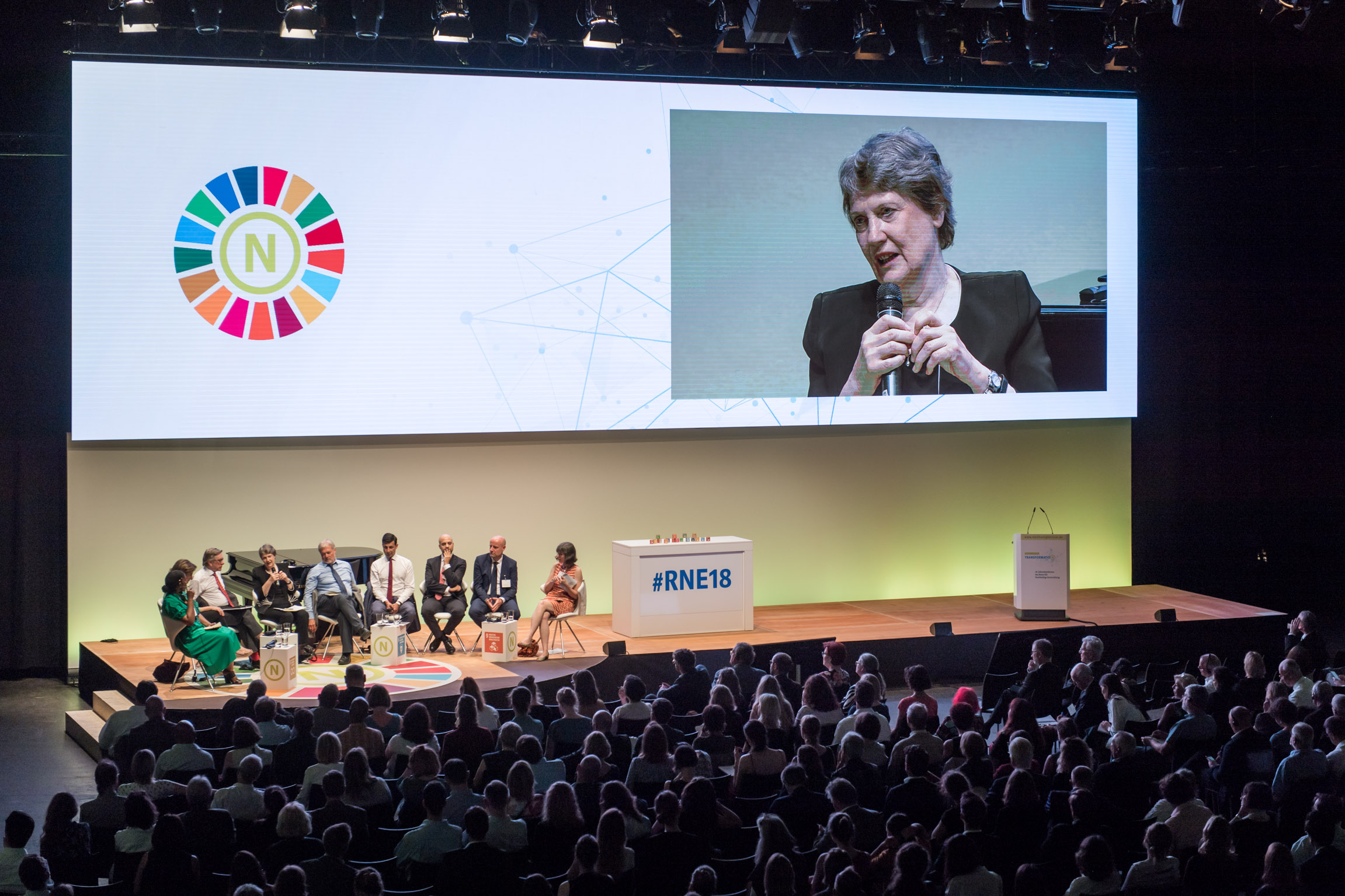
The group of international experts at the RNE Annual Conference on 4 June 2018. Photo: Ralf Rühmeier, © German Council for Sustainable Development (RNE)
It is a day of taking stock. The German Council for Sustainable Development (RNE) invited interested parties to come to the Tempodrom in Berlin for its 18th annual conference which was attended by an audience of some 1,400 guests from Germany and abroad. The key question being: where is German sustainable development policy at?
In her opening address, Marlehn Thieme, Chairwoman of the RNE, forgoes any suspense, saying: “Without wanting to fall into false exclamations of catastrophe, the answer is yes, we have great cause for concern.” If politics were to give up on its goal of reducing greenhouse gas emissions by 2020, for instance, she warned, it would endanger not only the climate but also democracy. It would signal that the political arena no longer believes in itself, which would in turn provide fuel for populist and right-wing movements. To put it another way: the world itself is at stake.
Thieme bases her statements on the results presented by an 11-person international expert commission that reviewed the German Sustainable Development Strategy in great detail over a period of around eight months. Facilitated by the RNE, the high-level commission met with stakeholders from throughout the German sustainable development policy arena, engaged in talks with some 100 representatives of politics, the business sector, civil society and academia and subsequently deliberated on conclusions and recommendations. Their work is summarised in a report that lays out where things are progressing well and where there is still work to be done.
On the whole, as an affluent high-tech country with engaged citizens and experience in stakeholder dialogue, Germany has “the capacities it needs” to achieve the transformation, stated Helen Clark as she introduced the report at the Tempodrom in Berlin and presented it to Federal Chancellor Angela Merkel. Clark, former Prime Minister of New Zealand and later Administrator of the Development Programme of the United Nations (UNDP), chaired the peer review. However, as Clark continued, “the results in practice are not what they should be.”
Biodiversity is disappearing, land consumption is decreasing too slowly and the carbon footprint in transportation, for instance, is stagnating. Moreover, health concerns related to obesity are growing and the fact that social disparity is widening further are criticisms also mentioned by Clark and the other Peers.
Seven of the Peers were also in attendance at the annual conference and were available to answer questions. They would all like to see a swifter tempo set and a higher level of ambition regarding the transformation towards a sustainable society – and formulated 11 recommendations:
- Keep what works, elevate what is good, and change what has failed to deliver. In the opinion of the Peers, Germany should address “off-track policies”. Generally speaking, as Peer Namhla Mniki-Mangaliso, Director of the African Monitor, pointed out: “We will get the future that we create.”
- Make the institutional architecture charged with implementing the GSDS more effective. Peer Farooq Ullah, who is Co-Chair of the UK Stakeholders for Sustainable Development, commented in Berlin: “We must develop better pathways for implementation,” all ministries must take on responsibility, for instance by drafting action plans.
- Raise the level of ambition for what Germany can achieve. The experts encourage Germany to “phase out” fossil fuels and “reverse the trend on biodiversity losses”, for instance.
- Foster a more conducive enabling environment for Leaving No One Behind. Even in Germany, migrants and the poor are excluded, commented Clark, and the dialogue surrounding sustainability is “often” solely concerned with ecological aspects. The Federal Government should provide an orientational framework that cultivates inclusion.
- The Federal Government should strengthen the executive’s central coordination capacities and address off-track indicators promptly. The Peers call for the State Secretaries’ Committee for Sustainable Development, chaired by the Chancellery’s Chief of Staff, to be “re-energised”, for example.
- Parliament: there needs to be more powerful parliamentary scrutiny. For instance, the Parliamentary Advisory Council on Sustainable Development should be made “more powerful”.
- The Council for Sustainable Development’s independent role should be strengthened. The experts advise that the legal entity status of the RNE be evaluated.
- Revamp communications. Adolfo Ayuso-Audry, Director General in the Office of the Mexican Presidency responsible for implementation of the 2030 Agenda and one of the Peers, advocates for “creating greater awareness”. The Peers suggest “establish(ing) a budget line for communicating the GSDS (German Sustainable Development Strategy)”.
- Enhance both capacity for systems thinking and education for sustainability. For example, politicians and officials should be prepared for participation in “informed debate”. Teresa Ribera, Director of the Institute for Sustainable Development and International Relations (IDDRI), explained: “Municipal governments know what they need to do – they just don’t know how.”
- Indicators: expand budgets for and activity on tracking progress. In the opinion of Peer Karl Falkenberg, former Special Adviser on Sustainable Development to the President of the European Commission, “Germany still thinks it is doing everything right, that we are leading the way.” However, for instance with regard to water quality and biodiversity this is not the case, he highlights.
- Deal with emerging issues and apply the principles of the GSDS to Germany’s global interactions. Peer Joost Oorthuizen, CEO of the Sustainable Trade Initiative, recommends to “look at your supply chains,” in particular at what impacts Germany’s trade patterns have around the world.
But isn’t progress contradicted by one thing in particular, namely growth? – came the question from the audience. Germany definitely needs to discuss the issue of prioritising “value over volume”, responded Peer Jan Gustav Strandenaes. The Norwegian policy consultant previously worked with staff at the United Nations, among other things.
Imme Scholz, Deputy Director of the German Development Institute (DIE), took the feedback from the experts on board as “encouragement”. And RNE Chairwoman Thieme summed up that it was “time for decisions to be taken that might not please everyone,” directing her appeal to the Chancellor.
As in previous years, Federal Chancellor Angela Merkel was in attendance for the RNE annual conference. In her speech, Merkel emphasised, “Sustainability has made great inroads in politics, the business sector and civil society. More and more people are facing up to the full breadth of the issue of how they can work sustainably and be sustainable consumers.” Nevertheless, the Chancellor announced that the Federal Government would be continuing to work to elevate the German Sustainable Development Strategy. The idea of sustainability must become even more the guiding principle for governmental action, she continued. In the view of the Peers, this is a crucial point. As the report states: “If Germany can’t pull out all the stops, who could?”
[document_slider ids=”9263,9652,4572″]
[links]
[link to=”https://www.nachhaltigkeitsrat.de/en/events/18th-annual-conference/”]Further information about the 18th annual conference of the German Council for Sustainable Development on 4 June 2018 at the Tempodrom in Berlin[/link]
[link to=”https://www.nachhaltigkeitsrat.de/en/annual-conference-2018/video/”]Videos 18th annual conference[/link]
[link to=”https://www.nachhaltigkeitsrat.de/en/projects/peer-review/”]Further information about the Peer Review[/link]
[/links]
